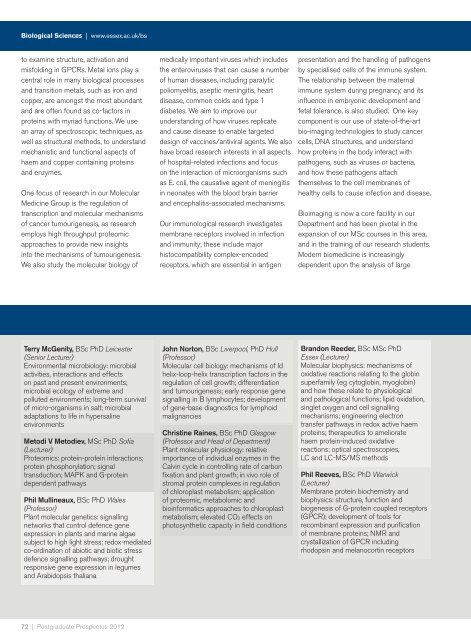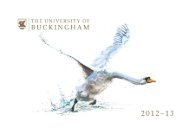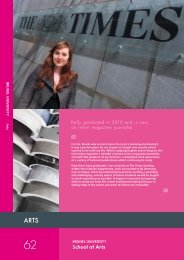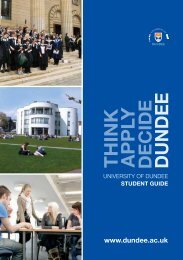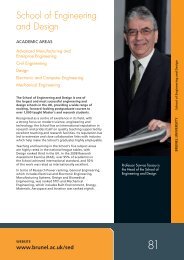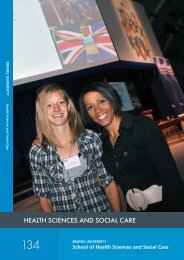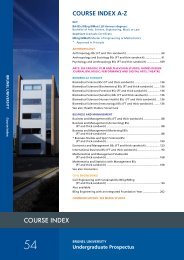Postgraduate Prospectus
Postgraduate Prospectus
Postgraduate Prospectus
You also want an ePaper? Increase the reach of your titles
YUMPU automatically turns print PDFs into web optimized ePapers that Google loves.
Biological Sciences | www.essex.ac.uk/bs<br />
to examine structure, activation and<br />
misfolding in GPCRs. Metal ions play a<br />
central role in many biological processes<br />
and transition metals, such as iron and<br />
copper, are amongst the most abundant<br />
and are often found as co-factors in<br />
proteins with myriad functions. We use<br />
an array of spectroscopic techniques, as<br />
well as structural methods, to understand<br />
mechanistic and functional aspects of<br />
haem and copper containing proteins<br />
and enzymes.<br />
One focus of research in our Molecular<br />
Medicine Group is the regulation of<br />
transcription and molecular mechanisms<br />
of cancer tumourigenesis, as research<br />
employs high throughput proteomic<br />
approaches to provide new insights<br />
into the mechanisms of tumourigenesis.<br />
We also study the molecular biology of<br />
medically important viruses which includes<br />
the enteroviruses that can cause a number<br />
of human diseases, including paralytic<br />
poliomyelitis, aseptic meningitis, heart<br />
disease, common colds and type 1<br />
diabetes. We aim to improve our<br />
understanding of how viruses replicate<br />
and cause disease to enable targeted<br />
design of vaccines/antiviral agents. We also<br />
have broad research interests in all aspects<br />
of hospital-related infections and focus<br />
on the interaction of microorganisms such<br />
as E. coli, the causative agent of meningitis<br />
in neonates with the blood brain barrier<br />
and encephalitis-associated mechanisms.<br />
Our immunological research investigates<br />
membrane receptors involved in infection<br />
and immunity; these include major<br />
histocompatibility complex-encoded<br />
receptors, which are essential in antigen<br />
presentation and the handling of pathogens<br />
by specialised cells of the immune system.<br />
The relationship between the maternal<br />
immune system during pregnancy, and its<br />
influence in embryonic development and<br />
fetal tolerance, is also studied. One key<br />
component is our use of state-of-the-art<br />
bio-imaging technologies to study cancer<br />
cells, DNA structures, and understand<br />
how proteins in the body interact with<br />
pathogens, such as viruses or bacteria,<br />
and how these pathogens attach<br />
themselves to the cell membranes of<br />
healthy cells to cause infection and disease.<br />
Bioimaging is now a core facility in our<br />
Department and has been pivotal in the<br />
expansion of our MSc courses in this area,<br />
and in the training of our research students.<br />
Modern biomedicine is increasingly<br />
dependent upon the analysis of large<br />
Terry McGenity, BSc PhD Leicester<br />
(Senior Lecturer)<br />
Environmental microbiology: microbial<br />
activities, interactions and effects<br />
on past and present environments;<br />
microbial ecology of extreme and<br />
polluted environments; long-term survival<br />
of micro-organisms in salt; microbial<br />
adaptations to life in hypersaline<br />
environments<br />
Metodi V Metodiev, MSc PhD Sofia<br />
(Lecturer)<br />
Proteomics: protein-protein interactions;<br />
protein phosphorylation; signal<br />
transduction; MAPK and G-protein<br />
dependent pathways<br />
Phil Mullineaux, BSc PhD Wales<br />
(Professor)<br />
Plant molecular genetics: signalling<br />
networks that control defence gene<br />
expression in plants and marine algae<br />
subject to high light stress; redox-mediated<br />
co-ordination of abiotic and biotic stress<br />
defence signalling pathways; drought<br />
responsive gene expression in legumes<br />
and Arabidopsis thaliana<br />
John Norton, BSc Liverpool, PhD Hull<br />
(Professor)<br />
Molecular cell biology: mechanisms of Id<br />
helix-loop-helix transcription factors in the<br />
regulation of cell growth; differentiation<br />
and tumourigenesis; early response gene<br />
signalling in B lymphocytes; development<br />
of gene-base diagnostics for lymphoid<br />
malignancies<br />
Christine Raines, BSc PhD Glasgow<br />
(Professor and Head of Department)<br />
Plant molecular physiology: relative<br />
importance of individual enzymes in the<br />
Calvin cycle in controlling rate of carbon<br />
fixation and plant growth; in vivo role of<br />
stromal protein complexes in regulation<br />
of chloroplast metabolism; application<br />
of proteomic, metabolomic and<br />
bioinformatics approaches to chloroplast<br />
metabolism; elevated CO2 effects on<br />
photosynthetic capacity in field conditions<br />
Brandon Reeder, BSc MSc PhD<br />
Essex (Lecturer)<br />
Molecular biophysics: mechanisms of<br />
oxidative reactions relating to the globin<br />
superfamily (eg cytoglobin, myoglobin)<br />
and how these relate to physiological<br />
and pathological functions; lipid oxidation,<br />
singlet oxygen and cell signalling<br />
mechanisms; engineering electron<br />
transfer pathways in redox active haem<br />
proteins; therapeutics to ameliorate<br />
haem protein-induced oxidative<br />
reactions; optical spectroscopies,<br />
LC and LC-MS/MS methods<br />
Phil Reeves, BSc PhD Warwick<br />
(Lecturer)<br />
Membrane protein biochemistry and<br />
biophysics: structure, function and<br />
biogenesis of G-protein coupled receptors<br />
(GPCR); development of tools for<br />
recombinant expression and purification<br />
of membrane proteins; NMR and<br />
crystallization of GPCR including<br />
rhodopsin and melanocortin receptors<br />
72 | <strong>Postgraduate</strong> <strong>Prospectus</strong> 2012


